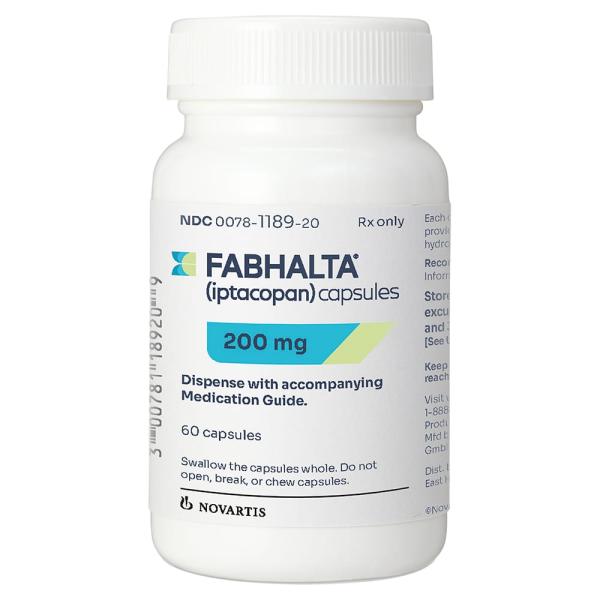Iptacopan Dosage
Medically reviewed by Drugs.com. Last updated on Jan 29, 2024.
Applies to the following strengths: 200 mg
Usual Adult Dose for:
Additional dosage information:
Usual Adult Dose for Paroxysmal Nocturnal Hemoglobinuria
200 mg orally twice a day
Comments:
- For patients switching from anti-C5 (eculizumab, ravulizumab) to this drug:
- To reduce the potential risk of hemolysis with abrupt discontinuation of other paroxysmal nocturnal hemoglobinuria (PNH) therapies:
- If switching from eculizumab: Start this drug no later than 1 week after the last eculizumab dose.
- If switching from ravulizumab: Start this drug no later than 6 weeks after the last ravulizumab dose.
- No information is available regarding the timeframe for starting this drug after other PNH therapies.
Use: For the treatment of patients with PNH
Usual Adult Dose for Primary Immunoglobulin A Nephropathy
200 mg orally twice a day
Comments:
- Approved under accelerated approval based on reduction of proteinuria; whether this drug slows kidney function decline in patients with immunoglobulin A nephropathy (IgAN) has not been established.
- Continued approval may depend on verification and description of clinical benefit in confirmatory trials.
Use: To reduce proteinuria in patients with primary IgAN at risk of rapid disease progression, generally a urine protein-to-creatinine ratio at least 1.5 g/g
Renal Dose Adjustments
Renal dysfunction: Data not available
Liver Dose Adjustments
Mild or moderate liver dysfunction (Child-Pugh A or B): No adjustment recommended
Severe liver dysfunction (Child-Pugh C): Not recommended
Precautions
The US FDA requires a Risk Evaluation and Mitigation Strategy (REMS) for iptacopan. It includes elements to assure safe use and an implementation system. For additional information: www.accessdata.fda.gov/scripts/cder/rems/index.cfm
US BOXED WARNING:
- SERIOUS INFECTIONS CAUSED BY ENCAPSULATED BACTERIA: This drug increases the risk of serious infections, especially those caused by encapsulated bacteria (e.g., Streptococcus pneumoniae, Neisseria meningitidis, Haemophilus influenzae type B). Life-threatening and fatal infections with encapsulated bacteria have occurred with complement inhibitors; such infections may become rapidly life-threatening or fatal if not recognized and treated early. Vaccination for encapsulated bacteria should be completed or updated at least 2 weeks before the first dose of this drug, unless the risks of delaying this drug outweigh the risk of developing a serious infection. Comply with the most current Advisory Committee on Immunization Practices (ACIP) recommendations for vaccinations against encapsulated bacteria in patients taking a complement inhibitor; the manufacturer product information should be consulted for further guidance managing risk of serious infections. Patients taking this drug are at increased risk for invasive disease caused by encapsulated bacteria, even if they develop antibodies after vaccination. Patients should be monitored closely for early signs/symptoms of serious infections and evaluated at once if infection is suspected. Due to the risk of serious infections caused by encapsulated bacteria, this drug is available only through a restricted program under a REMS.
CONTRAINDICATIONS:
- Serious hypersensitivity to the active component or any of the ingredients
- Initiation with unresolved serious infection caused by encapsulated bacteria, including S pneumoniae, N meningitidis, or H influenzae type B
Safety and efficacy have not been established in patients younger than 18 years.
Consult WARNINGS section for additional precautions.
Dialysis
Data not available
Other Comments
Administration advice:
- At least 2 weeks before starting this drug, vaccinate patients against encapsulated bacteria (including S pneumoniae and N meningitidis [serogroups A, C, W, Y, and B]) according to current ACIP recommendations.
- If urgent treatment with this drug is indicated in a patient who is not up to date with vaccines for S pneumoniae and N meningitidis according to ACIP recommendations, provide the patient with antibacterial drug prophylaxis and administer these vaccines as soon as possible.
- This drug can be administered with or without food.
- Swallow capsules whole; do not open, break, or chew capsules.
- If a dose or doses are missed, administer 1 dose of this drug as soon as possible (even if it is almost time for the next scheduled dose) and then resume the regular dosing schedule.
Storage requirements:
- Store at 20C to 25C (68F to 77F); excursions permitted between 15C and 30C (59F and 86F).
General:
- Health care providers who prescribe this drug must enroll in the FABHALTA REMS.
Monitoring:
- Hematologic: For signs/symptoms of hemolysis (for at least 2 weeks after the last dose)
- Infections/Infestations: For early signs/symptoms of serious infection
- Metabolic: Serum lipid parameters (periodically during therapy)
Patient advice:
- Read the US FDA-approved patient labeling (Medication Guide).
- Seek immediate medical attention if the following signs/symptoms occur:
- fever with or without shivers/chills
- fever and rash
- fever with chest pain and cough
- fever with breathlessness/fast breathing
- fever with high heart rate
- headache with nausea/vomiting
- headache and fever
- headache with a stiff neck/back
- confusion
- body aches with influenza-like symptoms
- clammy skin
- eyes sensitive to light
- Carry the Patient Safety Card for this drug with you at all times during and for 2 weeks after therapy.
- For patients with PNH:
- To minimize the risk of hemolysis, it is important to take this drug as prescribed.
- If this drug is discontinued, you should be monitored by your health care provider for at least 2 weeks after the last dose.
Frequently asked questions
More about iptacopan
- Check interactions
- Compare alternatives
- Side effects
- During pregnancy
- Drug class: selective immunosuppressants
- Breastfeeding
- En español
Patient resources
Other brands
Professional resources
Other brands
Related treatment guides
See also:
Further information
Always consult your healthcare provider to ensure the information displayed on this page applies to your personal circumstances.


